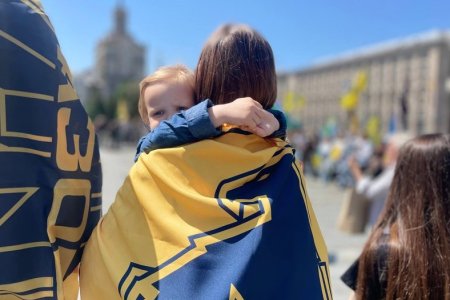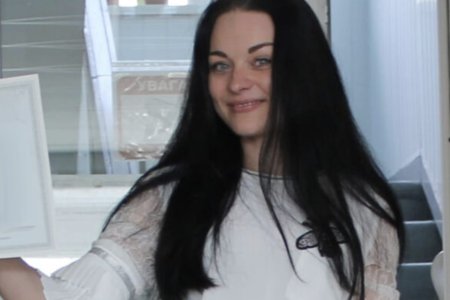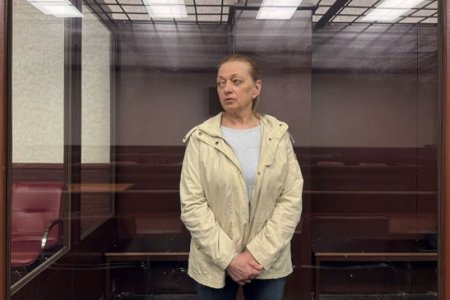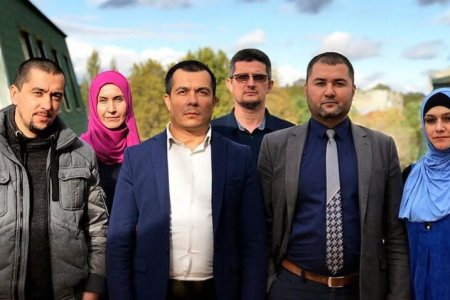
Albert Kruhlov will be turning 24 on 27 May, his second birthday in Russian captivity on ‘terrorism’ and ‘treason’ charges linked with his plan to join a regiment defending Ukraine. In recognizing Kruhlov as a political prisoner, the renowned Memorial Support for Political Prisoners Project pointed out that the actions which Russia has imprisoned him for were not only morally correct but were also in full compliance with the law of his country, Ukraine.
Russia, as aggressor state, is in grave violation of international law not only through its war of aggression, but because it is foisting its citizenship and applying its legislation against Ukrainian nationals on occupied territory. For all of these reasons, the charges against Kruhlov and long prison sentence passed are by definition unlawful whether or not he was trying to reach mainland Ukraine to join the Azov Regiment. While it is clear that Kruhlov has never supported Russia’s invasion and occupation, there are, in fact, no guarantees that he was indeed planning the actions impugned. His alleged ‘full admission of guilt’ was obtained while he was held prisoner by the Russian FSB who are notorious for obtaining ‘confessions’ through torture and threats to use the same methods against wives, mothers or other relatives.
Despite the extremely serious charges, Kruhlov was not, in fact, accused of anything that Russia had any right to prosecute him for. The FSB claimed that they had ‘thwarted’ his plan to get to mainland Ukraine and join the Azov Regiment which, as part of Ukraine’s National Guard, was actively engaged in defending Ukraine against Russia’s invasion. The prosecution asserts that Kruhlov “being an active opponent of military action in Ukraine”, had made two attempts to get to government-controlled Ukraine. He had himself been forced to return from an earlier unsuccessful attempt from Dzhankoi (Crimea) to occupied Melitopol. He was then seized by the FSB at the coach station in occupied Simferopol on 16 November 2022 with this purportedly obstructing his second attempt (via Sochi to Minsk from where he allegedly planned to cross into Ukraine from Belarus). Suspicion seems warranted about this alleged plan given the claim that Kruhlov was taking a knife, a gas mask, camouflage boots and other similar items.
Kruhlov has been imprisoned ever since. The alleged plan to join ‘Azov’ was used as pretext for charging the young Ukrainian with ‘planning state treason’ (Article 30 § 1 and Article 275 of Russia’s criminal code) and with “the intention of joining a terrorist organization’ (Article 205.5 § 2). Both charges were based on amendments to Russian legislation introduced after Russia’s full-scale invasion of Ukraine. Memorial explains that, in July 2022, Russian leader Vladimir Putin signed into force a law which equated changing to the side of ‘the enemy, that is, joining the armed forces of a foreign state during an armed conflict’ with ‘state treason’. Since 28 April 2023, ‘treason’ under Article 275 of Russia’s criminal code) can carry a life sentence.
Russia has made it next to impossible to live and work in occupied Crimea without Russian citizenship, although it seems that Kruhlov had, at one stage, tried, unsuccessfully, to renounce this foisted citizenship. Such coercion, which is a flagrant infringement of the Fourth Geneva Convention, is then used to claim that Ukrainian citizens who seek to defend their own country against a foreign invader, are committing ‘treason with respect to the aggressor state’.
The other charge is no less cynical. On 2 August 2022, Russia’s Supreme Court passed one of its many politically motivated rulings, declaring the Azov Regiment to be a ‘terrorist and extremist organization’ and totally banning its activities on the territory of the Russian Federation. Russia is also illegally imposing this absurd ban on occupied Ukrainian territory. While abysmally failing to counter real acts of terrorism, such as the attack on the Crocus City Hall in March 2024, Russia regularly uses such rulings to justify ‘terrorism’ charges and huge sentences against Ukrainian political prisoners.
The charges against Kruhlov were passed to Russia’s notorious Southern District Military Court in April 2023, with the first hearing on 29 May. The indictment asserted that “Kruhlov did not accept the idea of the special military operation [Russia’s euphemism for its war of aggression against Ukraine] and in February 2022 decided to travel from Russia [sic] to Ukraine to join the side of the enemy. He wished to carry out activities against Russia’s security, and took information about the Azov National Battalion from the banned social network Instagram”.
The prosecutor had demanded a 12-year sentence, however, on 4 October 2023, presiding judge Sergei Fedorovich Yarosh and two other judges found Kruhlov ‘guilty’ of planning both ‘treason’ and ‘to join a terrorist organization’, but lowered the sentence due to his ‘admission of guilt’. He was sentenced to 8 years maximum-security imprisonment, with the first three in a prison, the worst of Russia’s penal institutions.
Memorial has given a damning assessment of the charges against Kruhlov, as well as pointing out that the reasons for doubting that any ‘admission of guilt’ was given voluntarily.
Albert Kruhlov was just 14 when Russia invaded Crimea, however his opposition to Russian occupation of Ukrainian Crimea is entirely clear from his Instagram page which was created in February 2015. He has both Ukrainian and Russian citizenship, although did, as he himself stated in court, endeavour to renounce the latter. The young man lived in Alushta, with his mother, and around the time of his arrest had been working for a construction firm.
Despite his age, Kruhlov had already served one sentence after the FSB searched his home in 2019, and supposedly found explosives, concealed in a thermos and a bottle. Here too, Kruhlov ‘admitted guilt’ with this later enabling the 18-month sentence to be shortened. It is unclear, however, why the FSB carried out a ‘search’ in the first place, and Russia’s security service is notorious for planting what it then claims to have found. There is no way at present of knowing, but it is noticeable that as well as two charges linked to the alleged explosives, Kruhlov was also accused of “calls to extremist activities on the Internet’ under Article 280 § 2. The young Ukrainian would have undoubtedly been under scrutiny following his release, would have known this to be the case.
Whether or not Albert Kruhlov was genuinely seeking to join ‘Azov’, and whatever the circumstances around his ‘confession’, the young Ukrainian is undoubtedly a political prisoner, against whom Russia has brought especially cynical charges.



